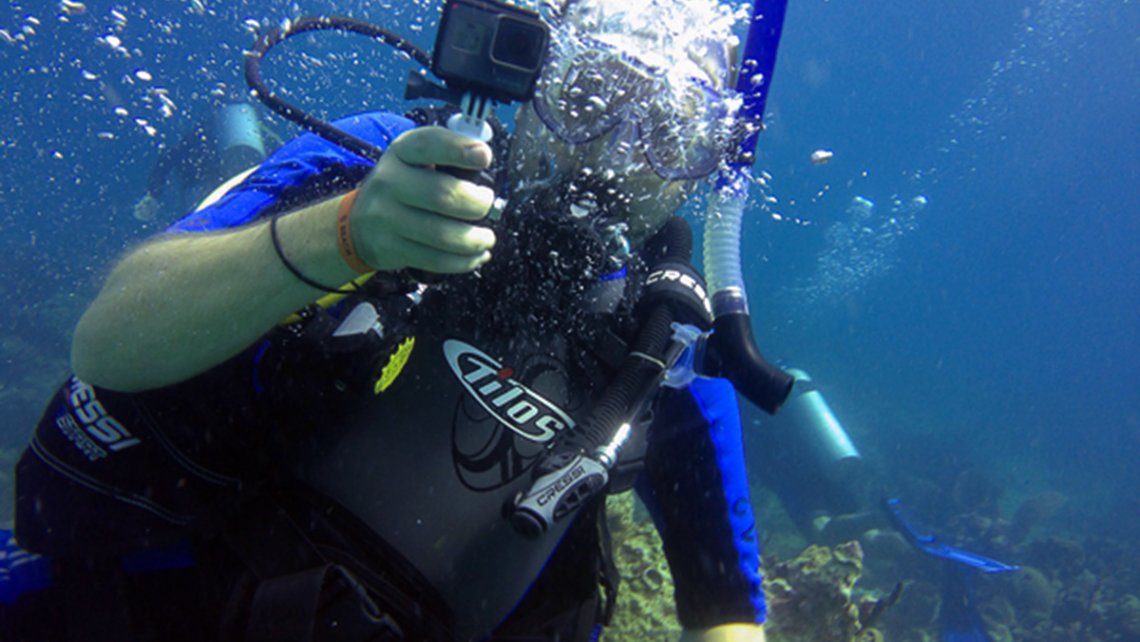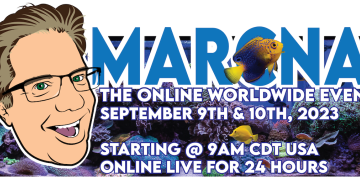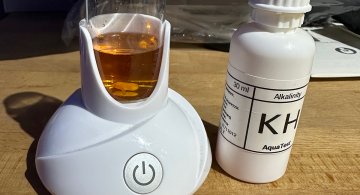If only SCUBA Divers were aquarists...
Many people have thought I've been SCUBA diving for a long time, but the truth is I only got certified about four years ago. I wanted to do it sooner, but life didn't work out that way. Those divers on my business card and website were put there as a goal to aspire to, and in 2012 I was able to reach that goal. Getting certified wasn't too difficult, I just had to purchase some gear, schedule some classes, do my bookwork and complete my checkout dives. Mere weeks later, I was diving off O'ahu and loving that down time. I felt very comfortable, in fact.
Since this was a goal of mine for so long, I often read stories about divers on various forums and in magazines. An exciting book called "Shadow Divers" delved into the wreck diving of a sunken U-boat off the coast of New Jersey from WWII. What has always fascinated me was the mindset of the diver, who explored the darker waters to find truths while risking their health and well-being. As I absorbed those stories about things that went wrong and how they corrected their situation, those experiences helped me personally plan ahead to avoid similar mistakes or risks.
No matter what group you look into, invariably you'll find these specific types: elitists, fanatics, complacents, newbies, and completely inexperienced. Plus what I'd like to refer to as the "normal" set. One feeling I came across often was that divers don't like aquarists because they are taking the animals out of the water and putting them in a box. Those divers prefer that the fish, corals and inverts be left alone in the (lakes or) oceans for others to enjoy, and allow that fish or invert to live their normal life. I get it, it's not an unreasonable stance. But as an avid hobbyist myself, I love the animals I've cared for over the past 18 years, having gotten to know them exceedingly well through observation and feedings. I've watched them grow in size, how they respond to water quality changes, and seen them adapt when necessary. As well as how they act in crisis-mode.
A couple of things that bother me about SCUBA diving are actually about the persons themselves. How they act in the water, how they interact with nature, and at the risk of sounding elitist myself, some just don't belong in the water in the first place. And here's why:
When you dive, you are doing more than donning a mask and breathing through an apparatus to give you the ability to stay underwater for a duration. Snorkelers often stay at the surface and stare down, while others take a breath and dive down for a handful of seconds to see something up close, but quickly head to the surface for a fresh lungful of air. That's a pretty safe bet you'll return home unscathed. SCUBA divers are reminded constantly that there are risks while diving, and to remain relaxed, calm and always breathe. Divers are doing more though - they are (or should be) constantly checking that they are being safe, measuring their depth and air consumption whilst tracking nitrogen build up and working through frightening moments when panic is telling you to bolt for the surface. Each diver quite literally has their life in their hands, and even the tiniest decisions matter greatly. Never diving alone, those decisions affect their dive buddy as well, and vice versa.
** I need to point out that I'm a new diver myself with only about 30 dives under my belt, but that doesn't invalidate my feelings based on what I've observed thus far. I don't expect my views will change much as those dive numbers increase.
Some people seem unqualified to dive when they are clearly frightened of the water. Non-swimmers, for example, that can't even put their face down in the still waters of a swimming pool seem ill-equipped to master SCUBA classes yet alone dive on their next tropical vacation. I observed this firsthand and though the instructor was a saint for even trying to help them get past that initial fear, at the same time I had to wonder how this would ultimately end for that person. Another important factor that every diver should have is a self-awareness of their surroundings. Their field of view is restricted by the mask, and as they move about they can kick other divers in the face and head, not to mention how they move about the obstacles underwater. Their gear needs to fit properly, and all the associated accessories need to be tethered to their body to prevent snagging anything underwater.
As aquarists, we know exactly how fragile life is and we gingerly reach into our reefs to avoid snapping SPS corals, and we only handle what we must. We are familiar with how things are balanced in place, and how a small nudge can make something topple on top of something else, stinging or worse yet, crushing the item beneath. If you've ever had a rockslide while re-aquascaping a small section of your reef, you know exactly how much you wished you had a third hand to hold one thing in place so you can re-secure a couple of necessary spots to get things just right. You grumble to yourself because you don't have a third hand, putting one coral on top of another coral tempoarily while you try to make a rock jigsaw puzzle itself back where it belongs so that coral can go back where it was before... and yet it won't cooperate. That mindset is what we bring with us into the ocean as aquarist-divers. We see the corals, we care for them far more than most other eco-friendly divers because we know how hard it is for that species to thrive. We've seen it contend with temperature swings, with algae congestion, with nutrient spikes, and with livestock warfare. We'll even pick up a fallen coral in nature so it has a better chance to survive.
To divers reading this that aren't aquarists, we don't dive looking to take more corals from the ocean - this diver certainly does not. When I found a big patch of ricordeas during my recent dive, I was so excited to find them on a reef. It was my very first time to see them in-situ, in fact. And I've been looking, trust me. I didn't fancy getting a few of these to take home with me. Instead, I took the time to appreciate them, to see how they encrusted the rocks and to note just how many I could see. Those colors(!!!) under natural sunlight rather than artificial lighting. I tried to capture a focused picture of them, which was quite challenging in itself.

What bothered me was seeing divers coming down onto the reef, damaging it with their fins, their gear... one woman came down like a turtle on her back and nearly smashed a huge barrel sponge colony. That aluminum tank strapped to her looked like a huge hammer heading for a soft nail, but at the very last second she managed to flip herself and avert the collision - thankfully. Others stood on the rock, corals, sand - and we know how those often house tiny critters and polyps of corals. They kicked up storms of sediment and more, and bumbled about the reef breaking things in their wake. While diving with aquarists, we focus on buoyancy to avoid contact, and slalom through rising corals, trying not to touch anything or as little as possible. We move like astronauts, pushing off a nearby rock with a mere fingertip after first checking to make sure the spot was only rock and nothing more. We gaze down into tall sponge structures to see what may be hiding within, peeking into holes and tiny nooks for shrimp, scallops, and anemones and more.
Other behavior that shocked me was having a fellow diver push me out of the way to see what I was trying to look at. It's a big ocean, and if I happen to find a 12" x 12" spot, odds are it will still be there when I drift away in 30 seconds. When that happened, I just moved on before I got kicked by this rude person, which was also very likely to happen next. My dive buddy observed another diver toy with an eel, putting his finger in front of the mouth of that toothy carnivore. She tried to warn him off, but he shunned her advice instantly which left her appauled by his risky thinking. Had he been bit, that would have affected everyone in the group naturally.
We had some good dive guides that helped us spot some of the fun stuff, and that made the dive better. But when a different dive guide intentionally spooked animals into the open merely so we can see them better, that was disappointing. Seeing eels swimming in full view, and then seeing them fight each other felt wrong. When people come to visit our homes, they see our reefs as they are. We don't "make the eel come out" or cause the "puffer to inflate." And as diving aquarists, we delight in what we see, but we don't poke, prod or give chase to the lovely animals we encounter. As visitors, we just want to get a glimpse into their lives and enjoy the satisfaction of doing so safely and without incident.
Nothing spoils your mood more than having your regulator knocked out of your mouth (there went your air) or your mask (and there went your vision) kicked off your face competely. Divers are trained to correct those incidents while at depth, and do so calmly and as efficiently as possible to avoid further complications. You'll be even more cautious about where those people are to avoid a reoccurence during that dive. And a feeling of resentment isn't easy to shake off when you can't stop to yell at them for being inconsiderate around you.
Knowing what you are seeing has got to be far more interesting than not, and as reef keepers I tend to think we benefit greatly from that. We quickly recognize many of the common soft corals, and know a large number of fish species. We not only appreciate how the reef looks, but remember how it was 'scaped so that we can mimic it back home. Seeing large groups of Yellow Coris wrasses moving about makes our hearts happy, and when we spy a lobster or octopus, we marvel at their ability to blend into their surroundings so nicely. We like to stop and study everything, hoping to see a few zoanthids, maybe a clam, or if you're very lucky a wild seahorse or two.
Diving with aquarists is so relaxing. We each hope to spot something really cool, and love seeing what our friends find.
I just think every diver should also be an aquarist. They'd be far more cautious of their surroundings and would work on their advanced buoyancy skills to do their utmost to hover above the creatures they find so interesting and not harm their homes. It's the polite thing to do.

















